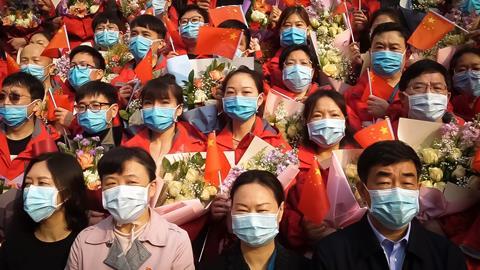Timely, and terrifying: Nanfu Wang’s documentary looks at government response to Covid-19 in the US and China

Dir: Nanfu Wang. US. 2021. 95 mins
In her far-reaching and eye-opening follow up to One Child Nation, Nanfu Wang explores the government responses of China and the US to the Covid crisis, and finds that misinformation spreads at least as efficiently as any virus. Combining personal reflections, collated stories from both social and mainstream media and extensive footage from local camera people in China and the US, Wang demonstrates how government control over messaging has led to the pandemic response being claimed as propaganda victory for the communist party in China and a weapon in a culture war in the US.
The picture draws parallels between China and the US when it comes to botched and skewed deployment of information
The film could hardly be more timely and, although the story it explores is still unfolding, public interest in the way the pandemic was (and is) handled, and the extent to which it could have been mitigated is likely to be high. Further festival slots are probable but a film such as this, which offers an in-depth account of a rapidly evolving situation, might be best served by an expedited release. HBO holds global rights.
As with her previous films, One Child Nation and Hooligan Sparrow, Wang places herself within the story that she tells. In January 2020, 19 days after a minor news story was broadcast across Chinese television networks telling of “eight people punished for spreading rumours about a new pneumonia”, Wang flew from her home in the US to China to spend Lunar New Year with her mother. She left her three-year-old son with her mother, then flew back to the US for work meetings. It was while she was apart from her son that the Chinese government, having hitherto downplayed the seriousness of the situation, locked Wuhan down. What followed was a desperate scramble to get her son out of the country before the borders shut. As her American husband flew back to China, Wang poured over social media posts, accounts of people dying in the streets, of hospitals full to capacity. Realising that these posts were transient – the government deleted them almost as quickly as they were uploaded – Wang archived as many as she could.
She recruited a team of camera people on the ground in Wuhan but was struck by restrictions on access and by the fact that the cameras were automatically turned off as soon the story took on a negative angle. To counter this, Wang encouraged the reporters to leave continuously running cameras in high traffic areas. What this captured was illuminating – Chinese state television offered blanket coverage of the crisis, but the spin on the news was stirringly upbeat. One of Wang’s cameras captures a television crew coaching the medics in a hospital corridor. “Say ’Go Wuhan, Go China!’” Meanwhile, in a neat editing device, she cuts together Chinese news reporters repeating, verbatim, the same presumably state-sanctioned wording.
The film is most revealing when it juxtaposes the official response to the pandemic with the heartbreaking individual human stories – a technique which she employs both in China, and in the US, where healthcare workers report threats of sackings in response to their requests for better protective gear. The picture draws parallels between China and the US when it comes to botched and skewed deployment of information. In the US, Wang suggests, the initial messaging from the Center for Disease Control and Prevention (CDC), which stated that the wearing of masks was unnecessary, contributed to the idea that mandatory mask-wearing was an impingement on basic freedoms. Meanwhile, in China, the government has spun the Covid response as a triumph, while concealing the number of deaths in Wuhan (the official tally admits to 3345, estimates put it at closer to 30,000).
A series of snapshots of a developing situation, the film, with its paranoid score and use of covert footage, strikes an ominous note about the future. In China, a spate of arrests of citizen journalists suggests that the communist party is tightening its grip on the flow of information. And, worldwide, a well of suppressed trauma is building within the frontline healthcare workers which isn’t just going to go away.
Production company: Motto Pictures, Little Horse Crossing The River, Little Lantern Company
Distribution: HBO
Producer: Nanfu Wang, Jialing Zhang, Julie Goldman, Christopher Clements, Carolyn Hepburn
Cinematography: (China) Matt Yu, Michelle Gao, Anonymous D, Anonymous K, R.C. Song, K. Yang (US) Jarred Alterman, Yuanchen Liu, Tom Bergmann, Martina Radwan, Michael Shade, Peter Alton, Rex Miller, Sam Rong, Gil de la Rosa, Paul Szynol
Editing: Nanfu Wang, Michael Shade
Music: Nathan Halpern
Main cast: Runzhen Chen, Peien Liu, Mingxing Tao, Wenbing Tao, Yingyun Ding, Yawen Wang, Li Zhou Family, The Wusinski Family, Diana Torres, Adam Witt, Dawn Kulach, Nicole Warring















![[L-R]: Amanda Villavieja, Laia Casanovas, Yasmina Praderas](https://d1nslcd7m2225b.cloudfront.net/Pictures/274x183/6/4/1/1471641_pxl_20251224_103354743_618426_crop.jpg)








